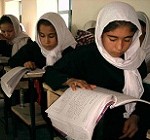In the ‘Poetics’, the earliest surviving work on dramatic theory, Aristotle analysed how poetry is superior to history because poetry speaks of what must or should be true, rather than prescribing the absolute truth. This absolute nature of history has more often than not led to it being at mercy of regimes and governments who control the way the past is depicted.
Much like events of our past impinge upon our beliefs, our notion of nationalism, perspective on public figures and several viewpoints is influenced and shaped by the past of our country, as it is depicted in our history books – a version that most of us unquestioningly accept.
Growing up, few people question the accounts handed out by teachers, parents or in school textbooks. The written word has the power of bestowing the halo of absolute truth on to subjects.
Qasim Aslam, a Lahore-based entrepreneur, was 14 years old when the notion of this absolute crumbled in front of him at a meeting with a group of students from India at an international camp organized by the Seeds of Peace in Maine, U.S.
Founded in 1993 by journalist John Wallach, the Seeds of Peace holds annual camps which bring together youth from different countries. The purpose of these camps is to inspire and equip young people with the awareness and skills required to promote lasting peace. The camp reaches out to countries in South Asia, West Asia and the U.S.
At these camps, dialogue sessions are held every day where the youth discuss history as it is portrayed in the school textbooks in their respective countries. The sessions helped bring forth the stark differences that existed in the narratives propagated or the absolute version of truths on both sides of the border. “To confront your society’s most extreme stereotypes and to see that they share your preferences and insecurities made a world of difference to how I viewed and interacted with differences”, says Aslam.
Just how stark these two absolutes of the same event are becomes apparent when one looks at how key events and figures from the Independence movement are portrayed in Indian and Pakistani textbooks. Take the 1905 Partition of Bengal. Indian textbooks say both Hindus and Muslims held joint protests against the British move to split the predominantly Hindu western areas from the Muslim-dominated east. However, textbooks in Pakistan make no reference to these protests. They say that Muslims were delighted as they were now in a majority in East Bengal. Similarly, Jinnah is portrayed in rather negative terms in many Indian textbooks, as are Gandhi and Nehru in Pakistan.
The experience at the camp prompted Aslam and Ayyaz Ahmed, a fellow participant, to start The History Project which brings these differing interpretations together in the same book in an attempt to show how these portrayals are affecting perceptions of youth from both sides of the border. Their collaborators from India are Lavanya Julaniya and Anil George. “Working on The History Project brought home clearly to me the power of a narrator’s bias to possibly create and sustain long-lasting conflicts,” says George.
The first history textbook which was brought out in early 2013 was compiled using books from the high school curriculum of both India and Pakistan. It is targeted at children between the ages of 12-16 years as these are the formative years when the core ideology of an individual is shaped. The book which is authored by people from both sides, juxtaposes contrasting views to help shape the critical reasoning abilities of future generations.
The textbook has so far been presented in a few public and private schools in India and Pakistan. The response from public schools in Pakistan has been especially encouraging although the governments of both countries are yet to show any interest in the initiative. The founders are planning to expand the approach to 10 more countries in the next five years, their next project being a book on the multiple versions of history across Israel-Palestine.
Shai Venkatraman is the Website Editor at Gateway House: Indian Council on Global Relations.
This blog was exclusively written for Gateway House: Indian Council on Global Relations. You can read more exclusive content here.
For interview requests with the author, or for permission to republish, please contact outreach@gatewayhouse.in.
© Copyright 2014 Gateway House: Indian Council on Global Relations. All rights reserved. Any unauthorized copying or reproduction is strictly prohibited


